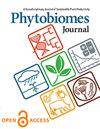M. Cregger, Dana L. Carper, Stephan Christel, M. Doktycz, J. Labbé, Joshua K. Michener, Nicholas C. Dove, E. Johnston, Jessica A. M. Moore, Jessica M. Vélez, J. Morrell-Falvey, W. Muchero, D. Pelletier, S. Retterer, T. Tschaplinski, G. Tuskan, D. Weston, C. Schadt
求助PDF
{"title":"植物与微生物的相互作用:从基因到生态系统——以杨树为模型系统","authors":"M. Cregger, Dana L. Carper, Stephan Christel, M. Doktycz, J. Labbé, Joshua K. Michener, Nicholas C. Dove, E. Johnston, Jessica A. M. Moore, Jessica M. Vélez, J. Morrell-Falvey, W. Muchero, D. Pelletier, S. Retterer, T. Tschaplinski, G. Tuskan, D. Weston, C. Schadt","doi":"10.1094/PBIOMES-01-20-0009-FI","DOIUrl":null,"url":null,"abstract":"Plant–microbe symbioses span a continuum from pathogenic to mutualistic, with functional consequences for both organisms in the symbiosis. In order to increase sustainable food and fuel production in the future, it is imperative that we harness these symbioses. The tree genus Populus is an excellent model system for studies examining plant–microbe interactions due to the wealth of genomic information available and the molecular tools that have been developed to manipulate Populus–microbe symbioses. In this review, we highlight how Populus can serve as a model system to explore plant–microbe interactions. Specifically, we highlight research linking Populus–microbe interactions from the gene to the ecosystem level. We explore why Populus is an excellent model for perennial plant systems, the molecular underpinnings of Populus–microbe interactions, how host genetics influence microbial community composition, and how microbial communities vary at fine spatial scales and between Populus spp. Furthermore, we explore how changes in the microbiome may affect ecosystem-level functions in managed and natural ecosystems. Understanding and manipulating these interactions in Populus has the potential to improve plant health and affect ecosystem sustainability and processes because Populus trees function as foundational species in many natural ecosystems and are also deployed in managed ecosystems for various agroforestry applications. [Formula: see text] Copyright © 2021 The Author(s). This is an open access article distributed under the CC BY-NC-ND 4.0 International license .","PeriodicalId":48504,"journal":{"name":"Phytobiomes Journal","volume":" ","pages":""},"PeriodicalIF":2.6000,"publicationDate":"2021-01-01","publicationTypes":"Journal Article","fieldsOfStudy":null,"isOpenAccess":false,"openAccessPdf":"","citationCount":"18","resultStr":"{\"title\":\"Plant–Microbe Interactions: From Genes to Ecosystems Using Populus as a Model System\",\"authors\":\"M. Cregger, Dana L. Carper, Stephan Christel, M. Doktycz, J. Labbé, Joshua K. Michener, Nicholas C. Dove, E. Johnston, Jessica A. M. Moore, Jessica M. Vélez, J. Morrell-Falvey, W. Muchero, D. Pelletier, S. Retterer, T. Tschaplinski, G. Tuskan, D. Weston, C. Schadt\",\"doi\":\"10.1094/PBIOMES-01-20-0009-FI\",\"DOIUrl\":null,\"url\":null,\"abstract\":\"Plant–microbe symbioses span a continuum from pathogenic to mutualistic, with functional consequences for both organisms in the symbiosis. In order to increase sustainable food and fuel production in the future, it is imperative that we harness these symbioses. The tree genus Populus is an excellent model system for studies examining plant–microbe interactions due to the wealth of genomic information available and the molecular tools that have been developed to manipulate Populus–microbe symbioses. In this review, we highlight how Populus can serve as a model system to explore plant–microbe interactions. Specifically, we highlight research linking Populus–microbe interactions from the gene to the ecosystem level. We explore why Populus is an excellent model for perennial plant systems, the molecular underpinnings of Populus–microbe interactions, how host genetics influence microbial community composition, and how microbial communities vary at fine spatial scales and between Populus spp. Furthermore, we explore how changes in the microbiome may affect ecosystem-level functions in managed and natural ecosystems. Understanding and manipulating these interactions in Populus has the potential to improve plant health and affect ecosystem sustainability and processes because Populus trees function as foundational species in many natural ecosystems and are also deployed in managed ecosystems for various agroforestry applications. [Formula: see text] Copyright © 2021 The Author(s). This is an open access article distributed under the CC BY-NC-ND 4.0 International license .\",\"PeriodicalId\":48504,\"journal\":{\"name\":\"Phytobiomes Journal\",\"volume\":\" \",\"pages\":\"\"},\"PeriodicalIF\":2.6000,\"publicationDate\":\"2021-01-01\",\"publicationTypes\":\"Journal Article\",\"fieldsOfStudy\":null,\"isOpenAccess\":false,\"openAccessPdf\":\"\",\"citationCount\":\"18\",\"resultStr\":null,\"platform\":\"Semanticscholar\",\"paperid\":null,\"PeriodicalName\":\"Phytobiomes Journal\",\"FirstCategoryId\":\"99\",\"ListUrlMain\":\"https://doi.org/10.1094/PBIOMES-01-20-0009-FI\",\"RegionNum\":3,\"RegionCategory\":\"生物学\",\"ArticlePicture\":[],\"TitleCN\":null,\"AbstractTextCN\":null,\"PMCID\":null,\"EPubDate\":\"\",\"PubModel\":\"\",\"JCR\":\"Q2\",\"JCRName\":\"MICROBIOLOGY\",\"Score\":null,\"Total\":0}","platform":"Semanticscholar","paperid":null,"PeriodicalName":"Phytobiomes Journal","FirstCategoryId":"99","ListUrlMain":"https://doi.org/10.1094/PBIOMES-01-20-0009-FI","RegionNum":3,"RegionCategory":"生物学","ArticlePicture":[],"TitleCN":null,"AbstractTextCN":null,"PMCID":null,"EPubDate":"","PubModel":"","JCR":"Q2","JCRName":"MICROBIOLOGY","Score":null,"Total":0}
引用次数: 18
引用
批量引用

 求助内容:
求助内容: 应助结果提醒方式:
应助结果提醒方式:


